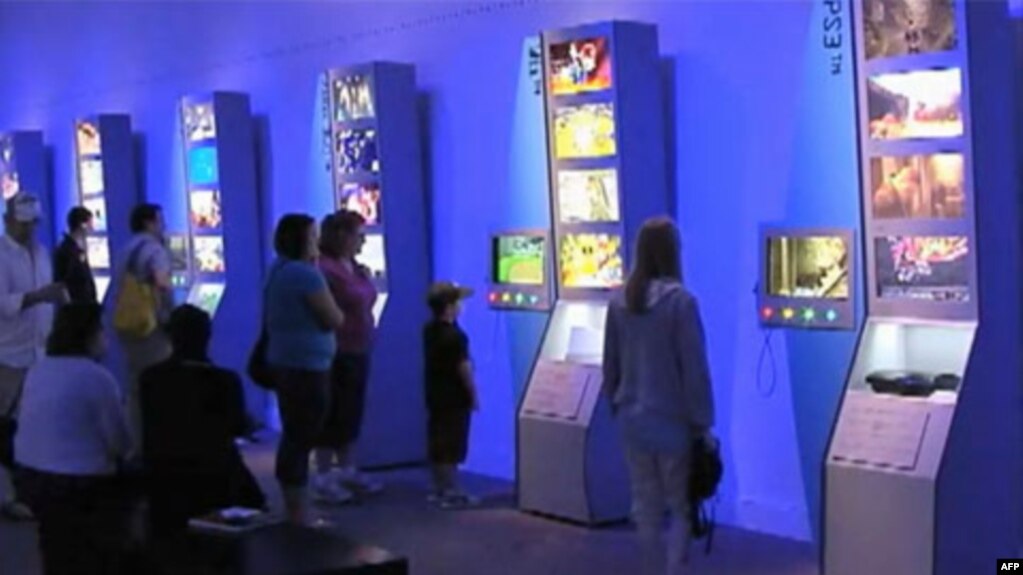
JUNE SIMMS: Welcome to AMERICAN MOSAIC in VOA Special English.
(MUSIC)
I’m June Simms. On the program today, we play new music from Justin Townes Earle...
And we return to a story about the sale of shares in a company that operates a famous New York skyscraper...
But first, we go play games at an art show in Washington...
(MUSIC)
“The Art of Video Games”
JUNE SIMMS: Most art exhibits have a no-touch policy. At the Smithsonian Institution, guards often give a warning if people position themselves too close to works of art. But, right now, the Smithsonian’s National Museum of American Art is inviting visitors to play with parts of its new exhibit, “The Art of Video Games.” Mario Ritter has our story.
(SOUND)
MARIO RITTER: Six-year-old gamer Jacob Smith enjoys playing at the museum.
JACOB SMITH: “Awesome…”
Jacob was prepared to take a favorite video game he found there.
JACOB SMITH: “I was really excited. I think that you could buy games here. Like I have some money.”
But none of the eighty games are for sale. They all are on loan from Chris Melissinos, who set up the show.
CHRIS MELISSINOS: “Video games have been present in my life since as long as I can remember.”
Chris Melissinos sees video games as more than just play things. He suspects other people feel the same way.
CHRIS MELISSINOS: “I think many of us who grew up with these always knew them to be something more than what they seemed to be on the surface. Whether or not we considered them to be art may have just been from a lack of maturity.”
Video game creation usually starts with pencil-drawn images on paper. The show includes some of these for visitors to look at. The history of video game art is explored through pictures and video in one room of the exhibit. The beauty and complexity of modern video games are clear next to earlier games like Pac-Man, which was developed thirty years ago in Japan.
One of the most interesting parts of modern gaming is the increasing involvement of the player. Chris Melissinos says that these days, the gamer really is in the game.
CHRIS MELISSINOS: “We see interactive storytelling that lets you guide the story along to make sure your included in the narrative.”
“Myst” was one of the earliest video games to present the story from the point of view of the gamer. “Myst” came out in the early nineteen-nineties. It is one of the five games that visitors can play with at the “Art of Video Games” show.
Thirty-two year old Brad Pittack says the exhibit was a trip back in time for him.
BRAD PITTACK: “It brings back memories from growing up to see some of the games at really my first introduction to video games in computer.”
Brad Pittack also enjoyed playing a new game called “Flower.” It creates the feeling one is floating through the air, like a flower petal on the wind. He says the experience was calming, unlike most video games.
“The Art of Video Games” will continue as the most playful exhibit in Washington through the spring and summer. The show at the National Museum of American Art closes on September thirtieth.
(MUSIC)
Empire State Building Update
JUNE SIMMS: We have new information about a report we presented last December. At that time, we talked about the Empire State Building in New York City. We reported on plans by its owner to sell shares in a publicly-traded company that would operate the world-famous structure. Here is Christopher Cruise with an update on our story.
CHRISTOPHER CRUISE: The Empire State Building has one hundred two floors. It was the tallest building in the world for more than forty years – from nineteen thirty-one to nineteen seventy-two. While it is no longer the tallest, people from around the world visit its eighty-sixth floor observatory to see New York from high above. The observatory is one of the city’s most-popular tourist attractions.
Recently, the company that owns the building said it is moving forward with plans to sell one billion dollars in shares in what is called an IPO, or initial public offering. Two classes of stock are to be offered. Class “A” shares will be sold to the public. Each Class “A” share is worth one vote. Class “B” shares will be sold to the Malkin family, which controls the company. Each Class “B” stock will hold fifty votes a share.
The Malkin family has spent almost five hundred million dollars fixing and modernizing the Empire State Building. The family said it plans to spend hundreds of millions of dollars more on the building and some of the other structures it owns. The money would come from the stock offering.
At least two groups of investors have taken legal action in an effort to block the offering. The Reuters news agency reported earlier this month that one group says the IPO awards too much of the value of the underlying properties to the Malkins. It says the family would control too much of the new company.
Unless a judge agrees to stop the IPO, shares should go on sale later this month. If that happens, many people will be able to say they are part-owners of the Empire State Building.
(MUSIC)
Justin Townes Earle
JUNE SIMMS: “Nothing’s Gonna Change the Way You Feel About Me Now,” is the latest album from Justin Townes Earle. He recorded his fourth album in only four days. Yet somehow he has created a timeless sound in this exploration of love, loss, rescue and recovery.

Justin Townes Earle is the son of Grammy Award winning musician Steve Earle. And like his father, he has had a history of drug problems. The younger Earle’s drug abuse began when he was still a boy. He has been in several recovery programs as an adult. His struggle is expressed in some of the songs on the new album, including “Look the Other Way.”
(MUSIC)
Justin Townes Earle also sings about love. “Baby’s Got A Bad Idea” is about a man who suspects his woman might be keeping a secret from him. But the song is not sad. It has a rock and roll, energetic dance sound.
(MUSIC)
On “Maria” Justin Townes Earle sounds sad and surprised at the loss of love. He sings: It used to be I was the object of affection / In your eyes alone / But now it seems your heart has found a new direction / And you’re leaving me out in the cold.
(MUSIC)
Justin Townes Earle grew up in Nashville, Tennessee – a city often called the home of Country Music. The thirty year old now lives in New York City. We leave you with a song about the neighborhood he lives in. Here is Justin Townes Earle performing “Lower East Side” from his new album, “Nothing’s Gonna Change the Way You Feel About Me Now.”
(MUSIC)
JUNE SIMMS: I’m June Simms. This program was written by Christopher Cruise and Caty Weaver who was also the producer.
For transcripts, mp3s, and now pdfs of this show and others, go to our website voaspecialenglish.com. We invite you to explore our relationship blog there. Feel free to share any advice you might have for other listeners. Or if you have a question about a relationship issue, write to mosaic@voanews.com. Put “relationship” in the subject line and please tell us your age, sex and where you live.
Join us again next week for music and more on American Mosaic in VOA Special English.
(MUSIC)




